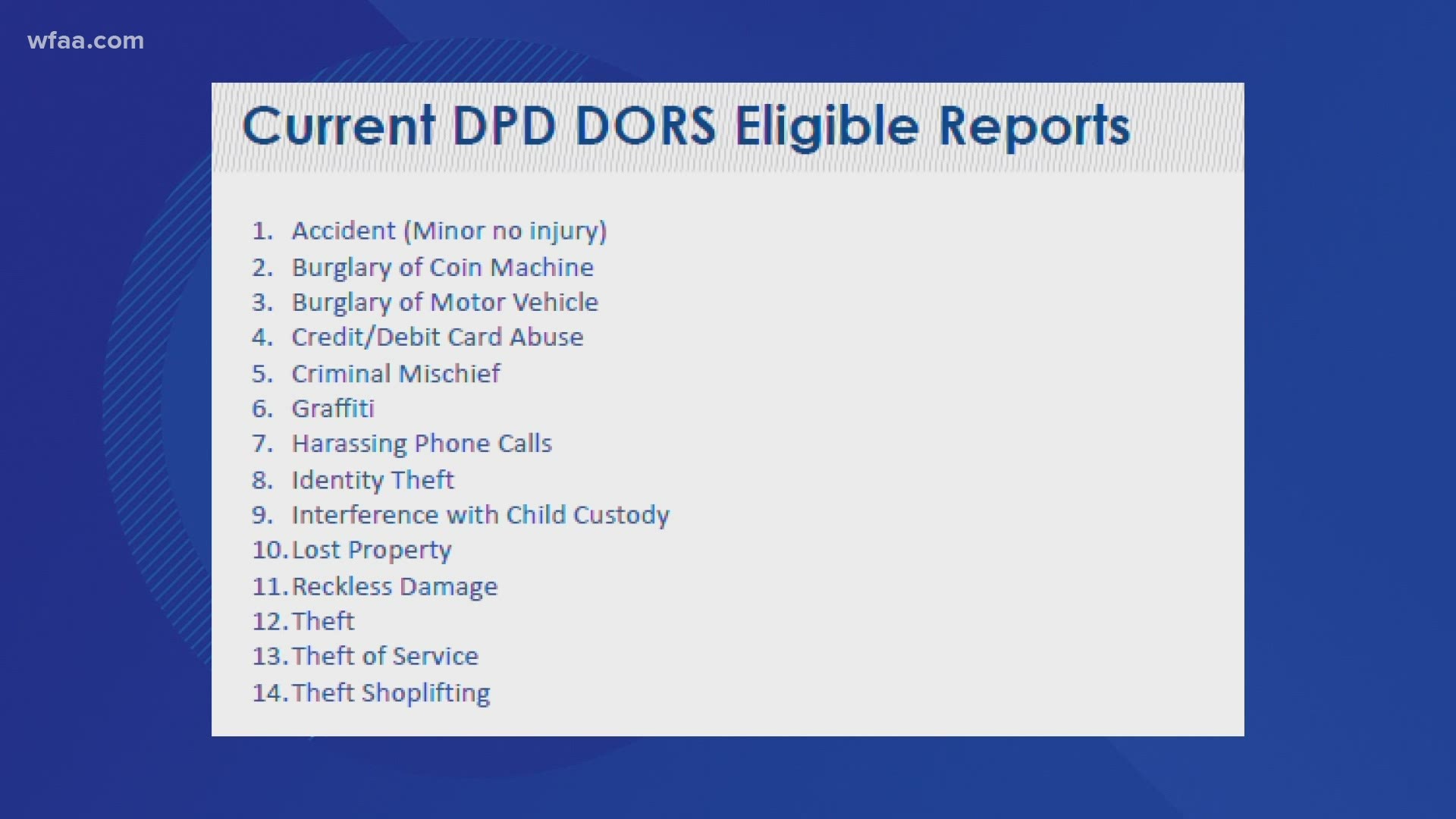City councilmembers expressed frustration Monday with an unauthorized memo that was released by an employee regarding the city's call diversion system, which had already been in place.
The Dallas Public Safety Committee met Monday afternoon to discuss the call diversion memo that was sent to employees at the 911 call center and gained attention on social media on Jan. 2. Communications and Technology Administrator Robert Uribe and Maj. Israel Herrera gave a presentation on the call diversion system through online and phone call reporting.
Councilmembers also discussed the need to educate the city's residents about the call diversion system.
The internal memorandum that had been prematurely released said that officers would no longer be dispatched to certain crimes, such as criminal mischief or graffiti, but that there would be some exceptions.
Uribe and Herrera said the department is investigating what led to the memo and what procedures failed regarding the memo, which was not authorized or approved, Uribe said. Councilmembers and committee members told Uribe and Herrera that their constituents raised concerns about the memo.
“I think it was unfortunate that it was released the way that it was. It makes your job harder,” said councilmember Adam Bazaldua. “It caused a lot of unnecessary hysteria.”
RELATED: 'Inauspicious start' to 2021: Dallas mayor responds to rescinded memo on 911 call diversion
The call diversion method to the Dallas Online Reporting System (DORS) is meant to prioritize officers to patrol the city and respond to high-priority crimes, rather than filling out paperwork, which the person needing assistance can complete online or by a phone call.
Reports that are currently eligible for call diversion include: accident (minor with no injury), burglary of coin machine, burglary of motor vehicle, credit-debit card abuse, criminal mischief, graffiti, harassing phone calls, identity theft, interference with child custody, lost property, reckless damage, theft, theft of service and theft shoplifting.
Bazaldua asked Uribe for an example of a theft.
“If an individual grabbed a candy bar and ran out of the store and was gone from the scene and we get a call 15 or 20 minutes later, that would qualify as a DORS or expeditor report,” Uribe said.
“If anyone is in danger, obviously we will have an officer respond,” Uribe said. “Anytime a call taker hears distress or disturbance in the background, an officer will be dispatched.”
Uribe also clarified on the “interference with child custody” report, saying an example was if a parent was late in dropping off a child at the court-agreed time, but the child was safe. Then one parent can report it so that it’s on file for an upcoming hearing.
These are not new changes to the protocol, but the city wanted to clear up any miscommunications, Assistant City Manager Jon Fortune said.
“The purpose [of the presentation] was to reiterate that, make people aware that we are not changing our response protocols at this time,” John Fortune said. “This was to highlight the benefits of the online platform and over-the-phone platforms.”
There are criteria to which calls can be sent to the online reporting or calls, and if a 911-caller wants an officer to come to the scene, one will come as soon as possible, Uribe said.
“I’d much rather have a patrol officer, instead of taking time to do a report of sunglasses taken from a motor vehicle, that they are preventing the sunglasses from being taken in the first place,” said Committee Chair Jennifer Staubach Gates. “Their presence is going to be stopping crime.”
Educating citizens
The department wants to create a 60-day campaign for public engagement to teach residents how to use the different reporting systems. Some committee members mentioned that some people don’t have technology or are not comfortable with it to go online, but the campaign will have to reach those people as well.
“We’ve got to wean people off, for lack of a better term, their addiction to call police every time there’s an issue,” said Councilmember Carolyn King Arnold. “Someone’s dog is up in a tree ‘we’re going to call the police.’ We have to learn to take an alternative method.”
Arnold said this will help with “putting boots on the ground.”
“We have to get this out there to let them know you [the police] are not abandoning us,” Arnold said. “This is the way we go to improve a true quality of life.”
Other major cities like Los Angeles, Phoenix, Seattle, Austin and Fort Worth also use online reporting for call diversions. The call diversion in Dallas hopes to create efficiency for a department that is short-staffed as crime increased in 2020.
December public safety update
The city is short on police officers and 911 call takers, Mayor Eric Johnson said in a newsletter regarding public safety.
Changes compared to November:
- Four fewer call takers
- Average 911 call holding time increased by two seconds
- Twenty-four sworn officers transitioned to non-sworn employees as part of the “KPMG civilization plan”
- Thirty-nine civilian employees hired, 10 more hirings than November
- Twenty-three civilian employees resigned, retired or were terminated
- Forty-five police officers and trainees resigned, retired or were terminated, 19 more than November
“It's great to see some progress in lighting and blight remediation. But police response times and 911 call waiting times still need a lot of work,” Johnson said in the newsletter. “The projected shrinking of the department can already be seen in the hiring and attrition numbers.”
Starting in 2018, the firm KPMG was hired and spent seven months analyzing staffing at the police department and in August 2019, it provided recommendations to the city council.
KPMG said that the top 911 call types in 2018 in Dallas were major disturbance (violence), other, suspicious person, minor accident, and business alarm. Of the top 11 call types during a five-year period, only 2.25% resulted in an arrest and 33% required a report.

